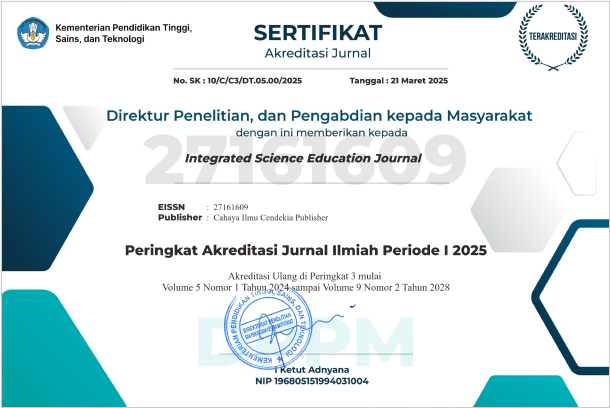Implementation of the Think Pair Share (TPS) Cooperative Learning Model with a Scientific Approach to Student Learning Outcomes
Abstract
Purpose of the study: This study aims to determine whether there is a significant effect on the application of the Think Pair Share (TPS) cooperative learning model with a scientific approach to the learning outcomes of seventh grade students of SMP Negeri 10 Jambi City.
Methodology: This type of research is an experimental research with a quantitative approach. The research design used was a posttest-only control design with two sample classes. The experimental class was taught using the TPS model in order to see its effect on student learning outcomes. The data collection method used test questions and observation sheets.
Main Findings: Because tcount > ttable, H1 is accepted and H0 is rejected at the 95% confidence level, so it can be concluded that there are differences in student learning outcomes using the Think Pair Share (TPS) cooperative learning model and learning using direct learning models in class VII SMP State 10 Jambi City.
Novelty/Originality of this study: Based on the results of the study, it can be concluded that there is a significant effect between the application of the Think Pair Share (TPS) cooperative learning model with a scientific approach on the learning outcomes of Class VII students of SMP Negeri 10 Jambi City.
References
Wirayuda, R. P., Darmaji, D., & Kurniawan, D. A. (2022). Identification of Science Process Skills and Students' Creative Thinking Ability In Science Lessons. Attractive: Innovative Education Journal, 4(1), 129-137.
Aldila, F. T., Wirayuda, R. P., Wulandari, M., & Ningsi, A. P. (2020). Description Of Science Process Skills Of Sman 10 Muaro Jambi’s Students On The Equilibrium Material On The Rope. Jurnal Pendidikan Fisika, 9(2), 112-119.
Isjoni. 2007. Cooperative learning. Bandung : Alfabeta
Wirayuda, R. P., Wandai, R., & Ginting, A. A. B. (2022). Hubungan Sikap Siswa Terhadap Hasil Pembelajaran Fisika SMA N 1 Kota Sungai Penuh. Integrated Science Education Journal, 3(1), 24-27.
Amin, A. Alimni., Kurniawan, DA, Chen, D., & Wirayuda, RP (2022). Servation of Bengkulu local wisdom: The application of Syarafal Anam in preventing student radicalism. International Journal of Instruction, 15(3), 931-948.
Abidin, Yunus. 2014. Desain Sistem Pembelajaran dalam Konteks Kurikulum 2013. Bandung: Rafika Aditama
Trianto. 2009. Mendesain Model Pembelajaran Inovatif-Progresif. Jakarta :Kencana
Hamdayana, Jumanta. 2013. Model dan Metode Pembelajaran Kreatif dan Berkarakter. Jakarta: Ghalia Indonesia
Majid, Abdul. 2014. Penilaian Autentik Proses dan Hasil Belajar. Bandung: Remaja Rosdakarya
Supatni, Ni M dkk. 2015. “Pengaruh Model Pembelajaran Think Pair Share (TPS) terhadap Prestasi Belajar Matematika dengan Kovariabel Kemampuan Numerik Siswa Kelas VI di SD Gugus II Bedulu”. (Jurnal Undiksha, Vol 5), diakses 22 Agustus 2015.
Muslim, F., Ekawarna, E., Ramalia, A., Wirayuda, R. P., & Chen, D. (2022). Learning Intensity and Visual Learning Style on Learning Outcomes. Journal of Education Research and Evaluation, 6(2).
Susanto, Ahmad. 2014. Teori Belajar dan Pembelajaran di Sekolah Dasar. Jakarta: Kencana
Surayya, L.2014. “Pengaruh Model Pembelajaran Think Pair Share Terhadap Hasil Belajar Ipa Ditinjau Dari Keterampilan Berpikir Kritis Siswa”. (Jurnal Universitas Pendidikan ganesha, Vol 4), diakses 22 Agustus 2015.
Sugiyono. 2014. Metode Penelitian Pendidikan. Bandung: Alfabeta
Mulyatiningsih, Endang. 2013. Metode penelitian Terapan Bidang Pendidikan. Bandung: Alfabeta
Sudjana, N. 2005. Metode Statistika.Bandung: Tarsito.
Wulandari, M., Wirayuda, R. P., Aldila, F., & Wulandari, R. (2020). Description of students' Integrated Science Process Skills on Friction Material on a Flat Field. Lensa: Jurnal Kependidikan Fisika, 8(2), 93-103.
Aldila, F. T., Wirayuda, R. P., Wulandari, M., & Ningsi, A. P. (2020). Description Of Science Process Skills Of Sman 10 Muaro Jambi’s Students On The Equilibrium Material On The Rope. Jurnal Pendidikan Fisika, 9(2), 112-119.
Copyright (c) 2022 Hayu Restiani, Euis Mawaddah Sariniwati

This work is licensed under a Creative Commons Attribution-NonCommercial 4.0 International License.
Authors who publish with this journal agree to the following terms:
- Authors retain copyright and acknowledge that the Integrated Science Education Journal is the first publisher licensed under a Creative Commons Attribution 4.0 International License.
- Authors are able to enter into separate, additional contractual arrangements for the non-exclusive distribution of the journal's published version of the work (e.g., post it to an institutional repository or publish it in a book), with an acknowledgment of its initial publication in this journal.
- Authors are permitted and encouraged to post their work online (e.g., in institutional repositories or on their website) prior to and during the submission process, as it can lead to productive exchanges and earlier and greater citation of published work.







.png)
.png)






